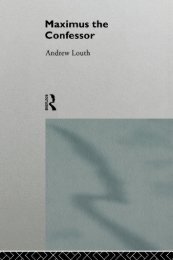Gospels of Thomas and Philip and Truth - Syriac Christian Church
Gospels of Thomas and Philip and Truth - Syriac Christian Church
Gospels of Thomas and Philip and Truth - Syriac Christian Church
You also want an ePaper? Increase the reach of your titles
YUMPU automatically turns print PDFs into web optimized ePapers that Google loves.
lived <strong>and</strong> died as a Jew.... Fulfillment <strong>of</strong> the [Mosaic] Law was essential.... The<br />
doctrine that Paul taught was new. He rejected the Law (as Jesus had never<br />
done),... <strong>and</strong> this was to shatter the mould <strong>of</strong> Jewish thought within which the faith<br />
had been born.<br />
James M. Robinson, The Nag Hammadi Codices (1977): The New Testament<br />
<strong>Gospels</strong> present the resurrected Christ as having a body that appears to be a<br />
human body— he is taken for a gardener, or for a traveler to Emmaus; he eats; his<br />
wounds can be touched.... Paul insists again <strong>and</strong> again that, although he was not a<br />
disciple during Jesus' lifetime, he did witness a genuine appearance <strong>of</strong> the<br />
resurrected Christ But his picture <strong>of</strong> a resurrection ‘body’ is a bright light, a heavenly<br />
‘body’ like a sun, star or planet, not like an earthly body. So the book <strong>of</strong> Acts, while<br />
recounting in detail Paul's encounter with Jesus as a blinding light, presents it as if it<br />
were hardly more than a ‘conversion’. For the author [<strong>of</strong> Acts] places it well outside<br />
<strong>of</strong> the period <strong>of</strong> resurrection appearances, which he had limited to forty days.<br />
Edward Schillebeeckx, Christ (1977): There is a difference between the<br />
theology <strong>of</strong> the early Jewish <strong>Christian</strong> congregations in Jerusalem which are<br />
oriented on Jesus <strong>of</strong> Nazareth, <strong>and</strong> Pauline theology, which knows only ‘the<br />
crucified’.<br />
Mircea Eliade, History <strong>of</strong> Beliefs <strong>and</strong> Religious Ideas (1978): Paul would have to<br />
be seen as fatally opposed to the Judeo-<strong>Christian</strong>s <strong>of</strong> Jerusalem, ... a conflict <strong>of</strong><br />
which Paul <strong>and</strong> the Acts (Gal 2:7-10, Acts 15:29) give contradictory versions.<br />
Barbara Tuchman, A Distant Mirror: The Calamitous 14th Century (1978): Of all<br />
mankind's ideas, the equating <strong>of</strong> sex with sin has left the greatest train <strong>of</strong> trouble....<br />
In <strong>Christian</strong> theology, via St Paul, it conferred permanent guilt on mankind.... Its<br />
sexual context was largely formulated by St Augustine, whose spiritual wrestlings set<br />
<strong>Christian</strong> dogma thereafter in opposition to man's most powerful instinct.<br />
<strong>Thomas</strong> Maras, The Contradictions in the New Testament (1979): In<br />
disagreement with [Matthew <strong>and</strong> Luke], who wish him to be a direct Son <strong>of</strong> God,<br />
Paul says to us [in Rom 1:3-4] that in the flesh Jesus is the descendent <strong>of</strong> David,<br />
<strong>and</strong> only in power is the Son <strong>of</strong> God.<br />
Patrick Henry, New Directions in New Testament Study (1979): There remains<br />
in the popular mind a strong suspicion ... that Paul corrupted <strong>Christian</strong>ity (or even<br />
founded a different religion).... Jesus [was] a teacher in the mainstream <strong>of</strong> Jewish<br />
prophetic piety,... while Paul ... takes the irrevocable step away from Judaism <strong>of</strong><br />
155




